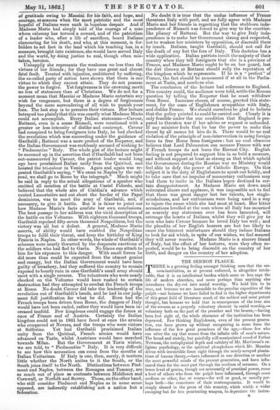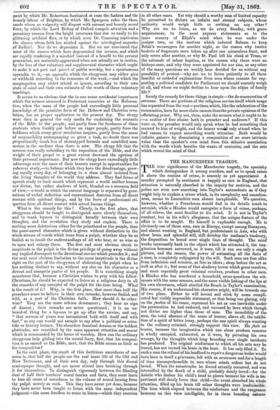THE SERMON PLAGUE.
THERE is a growing feeling amongst thinking men that the ser- mon-institution, as at present enforced, is altogether intole- rable, that it is an intellectual burden which more or less saps the life of modern churches, and more perhaps than anything else introduces the dry-rot into social worship. We hold this to be true, not because we are insensible to the peculiar capacities of the pulpit—not because we have failed to find in the higher departments of this great field of literature much of the noblest and most potent thought, but because we hold that in consequence of the true aim of the sermon as a properly voluntary element in social worship,— voluntary both on the part of the preacher and the hearer,—having been lost sight of, the whole character of the institution has been depraved. Few thinking Englishmen, even of the present genera- tion, can have grown up without recognizing in some form the influence of the few great preachers of the age,—those few who can utter the cry that comes from the infinite side of man's nature. The broad and stately, but painfully self-manipulated creed of Father Newman, the metaphysical depth and subtlety of Mr. Martineau's re- ligious psychology, or the spiritual ploughshare which Mr. Maurice drives with irresistible force right through the neatly-arrayed planta- tions of human theory,—have influenced in one direction or another the most powerful minds of the present generation, and have influ- enced them for the most part through the medium of sermons. On a lower level of genius, though not necessarily of practical power, come a host of others who from the pulpit have influenced, through some medium or other, fine or coarse—for evil or good, or usually per- Imps both—the conscience of their contemporaries. It would be simply absurd in the press of this country, which wields a wider sweeping but far less penetrating weapon, to depreciate the instru- ment by which Mr. Robertson fascinated at once the fashion and the homely labour of Brighton, by'which Mr. Spurgeon rules the thou- sands whom no vulgarity will disgust with earnest and homely moral force, by which the Lord Bishop of Oxford compels attention and a pecuniary ransom from the bright creatures that rise so easily to his glittering artificial flies, or by which even Dr. Cumming captivates the classes whom faith has steeled against the astrological auguries of Zadkiel. Nor do we depreciate it. But we are convinced that most of the causes which have degenerated the sermon, and which are rapidly rendering it a mischief instead of a benefit to the present generation, are materially aggravated when not actually set in motion, by the loss of that voluntary and supplemental character which ought to make it not part and parcel of public worship, but a spontaneous appendix to it,—an appendix which the clergyman may either give or withhold according to the resources of the week,—and which the congregation may either attend or ignore, according to their own state of mind and their own estimate of the worth of these voluntary teachings.
It seems to us obvious that the in one sense accidental importance which the sermon assumed in Protestant countries at the Reforma- tion, when the mass of the people had exceedingly little personal knowledge of the primitive form of the Hebrew and Christian reve- lation, has no proper application to the present day. The clergy were then in general the only media for explaining the contents of the Bible to the people; and partly from the freshness of these contents when frankly put before an eager people, partly from the boldness which every great revolution inspires, partly from the sense of responsibility accompanying so great a task, no doubt there was proportionally much less of stereotyped formula and sanctified man- nerism in the medium than there is now. The clergy felt that the sermon was really subsidiary to the exposition of the Bible, and the weight of their gospel to a great extent -drowned the egotism of their personal importance. But now the clergy have exceedingly little advantage over the mass of their hearers except in opportunities for coherent study,—to balance which they have the disadvantage, grow- ing rapidly every day, of belonging to a class almost isolated from the living thoughts of the world they address. They find forms of speech ready to their mouth which represent a world neither human nor divine, but rather shadows of both, blended on a common field of view,—a world in which the current language is separated by gene-- rations of verbal definition and conventional doctrine from all direct contact with spiritual things, and by the force of professional eti- quettes from all direct contact with actual human things.
What is the remedy for this ? Clearly, in the first place, that clergymen should be taught to distinguish more clearly themselves, and to teach laymen to distinguish broadly between their own thoughts, and the revelation they study and explain. There is nothing more deleterious either for the priesthood or the people, than the quasi-sacred character which is given without distinction to the whole stream of words which issue from a pulpit, whether they be so foolish as to insult the understandings of all who hear, or so wise as to open and enlarge them. The first and most obvious check to ineptitude in the pulpit is the divine privilege of going away without any implied disrespect to the devotional service which precedes it ; and the next most obvious limitation to the same ineptitude is the divine right on the part of the clergyman of abdicating the pulpit when he has nothing distinct to say, without any slur on his character as a devout and energetic pastor of his people. It is something simply monstrous that, because a Christian wishes to pray with his fellow- Christians, he should be expected to listen as a religious duty to all the remarks of any occupier of the pulpit for the time being. What is the result of it? Why, in the first place, that more than half the preachers come to believe in their own remarks, however foolish and wild, as a part of the Christian faith. How should it be other- wise? They see the same solemn demeanour; they hear no sign of dissent ; their remarks are never questioned ; it is an un- heard-of thing for a layman to go up after the service, and say, " that sermon of yours was inconsistent both with itself and with fact," as any one would not scruple to say after a political or scien- tific or literary lecture. The absurdest fanatical dreams or the boldest platitudes, are sanctified by the same apparent attention and assent which is commanded by the forms of worship. How can the ordinary clergyman help gliding into the unreal fancy, first, that his composi- tion is as sacred as the Bible, next, that the Bible means as little as his composition ?
In the next place, the result of this factitious sacredness of ser- mons is, that half the people see the real inner life of the Old and New Testament, and of their own day, only through this dismal semi-opaque thought, and are never stirred into breaking through it for themselves. To distinguish vigorously between the blinding dust of half their teachers' moral fancies and facts, they must learn to lose all sense of sacredness in the volume of sound issuing from the pulpit merely as such. This they have never yet done, because they have never been taught to listen with the same independent judgment—the same freedom to cease to listen—which they exercise in all other cases. Yet why should a worthy man of limited capacity be permitted to dictate on infinite and eternal subjects, whose authority would weigh little or nothing on any other ? Why are we to listen, as we do every Sunday, with grave acquiescence, to the most express statements as to the inner scenery of Elijah's mind when he was under the juniper tree, or the motives which induced Balaam to keep Balak's messengers for another night, or the reason why twelve baskets of fragments were taken up after one miraculous feast, and only seven after another, or why St. Paul left his cloak at Troas, or the rationale of infant baptism, or the causes why there were no bishops once, and why they were appointed for our sins, or any other of the many questions we weekly hear decided for us without any possibility of protest—why are we to listen patiently to all these fanciful et cathedrd explanations from men whose reasons for sup- porting a political candidate for Parliament we should scarcely weigh at all, and whom we might decline to hear upon the ethics of family life?
Surely the remedy for these things is simple—the de-consecration of sermons. There are portions of the religious service itself which usage has separated from the rest—portions which, like the celebration of the communion, have far more claim onmen thanthe private opinions of the officiating priest. Why not, then, make the sermon what it ought to be —a matter of free choice both in preacher and audience P If this were so, the preacher would only speak when he had something that seemed to him of weight, and the hearer would only attend when he had reason to expect something worth attention. Both would be infinite gainers by dissociating a composition of no more intrinsic value than the speaker's own mind from this delusive association with the words which breathe the wants of centuries, and the acts which reveal the mind of God.































 Previous page
Previous page